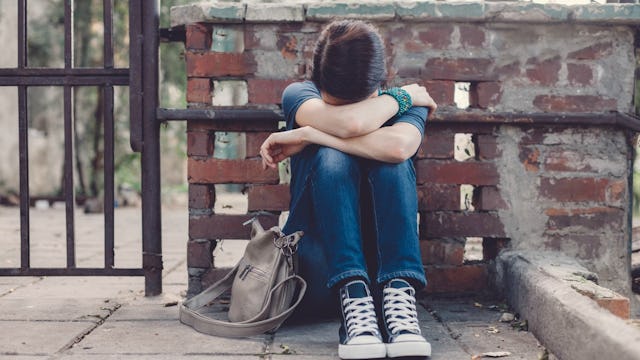Your Child’s Mental Illness Is Not Your Fault, But They Need You To Support Them Through It

I’ll never forget the look in my mother’s eyes when she entered principal’s office. They were wide, and tired. And no matter how thick glasses were nor how heavy her makeup had been caked on, neither could hide the truth: she was hurt. She was disappointed and disheartened, and she was afraid.
Of course, as a mother myself, I get it. I completely understand.
When I left her house that morning, things seemed normal. I seemed fine, and everything appeared to be a-freakin-okay. But now? Now she was being told her daughter was sick. She was being told her 15-year-old daughter was (well, may be) suicidal and that news is difficult to process for anyone, but especially for a parent.
It is heartbreaking to hear the words “we think your child may be a danger to herself” when you are a parent. No parent wants to hear those words.
Unfortunately, my mother didn’t just learn about my suicidal thoughts that day. Instead, that was the day she learned I was hurting. That I was cutting, and that I had a mental illness. Depression, to be exact.
It was a lot to learn in one day.
And while I felt a lot of things in that moment — I felt shame and joy, fear and relief — I never stopped to think about what my mother felt. I never asked my mother how she was feeling in that moment. (What can I say: I was young, sick, and struggling and my mind was elsewhere.)
But even though we’ve never had this conversation, I know her heart broke when she learned I was sick, and suffering. When she realized how much I was struggling each day. And her world collapsed when she realized there wasn’t a damn thing she could do to “fix” me.
Because, as parents, we naturally want to solve our children’s problems. We want to “fix” their problems, and we do everything we can to help our children, to protect them, and to ensure they are healthy, happy, and safe. But my health, happiness, and safety were waning, and nothing she did or could do would change that.
And that hurt her.
It crushed her — and I know that if your child is sick and struggling you likely feel the same way.
But let me tell you a secret mamas (and dads too): some boo-boos cannot be mended. Some pains cannot be abated and sometimes, despite our best efforts, our children will struggle. They will hurt, and they will cry, and that is true with any illness, specifically with mental illness.
But that doesn’t mean you are bad parent. It doesn’t mean you are a cold, callous, or unloving parent, and your child’s mental illness is not the result of something you did or failed to do. You could not have prevented this.
Because mental illness is physiological. It is biological. It is chemical. Mental illness is just that: an illness — and one which is not your fault.
Let me say that again: your child’s mental illness is NOT your fault.
Make no mistake, I know that doesn’t make things any easier, especially when your child is facing demons which you cannot understand and cannot do a thing to stop. But you know what? They don’t want you to fix them. They don’t expect you to fix them.
They don’t even need you to have all the answers.
What they need is for you to love them and listen to them. What they need is for you to guide them and support them, and be there for them. All day. Everyday. Without shame, stigma, or a single condition.
So please understand that while it is okay to be saddened and worried by their diagnosis, being diagnosed with a mental illness isn’t the end of the world.
It isn’t a death sentence.
It is just a new life. A different (and, yes, sometimes very difficult) life. But it is one which you can get through together.
So let go of the guilt. Let go of the shame, the remorse and responsibility. Because this isn’t a time to place blame or point fingers. It is the time buck up, step up, and listen.
Love them and listen.
Because your kid needs you now more than ever.